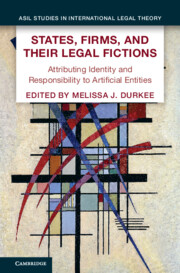 States, Firms, and Their Legal Fictions
States, Firms, and Their Legal Fictions Book contents
- States, Firms, and Their Legal Fictions
- ASIL Studies in International Legal Theory
- States, Firms, and Their Legal Fictions
- Copyright page
- Contents
- Contributors
- Acknowledgments
- 1 Introduction
- Part I International Attribution
- Part II Transnational Attribution
- 6 Corporate Structures and the Attribution Dilemma in Multinational Enterprises
- 7 Transnational Blame Attribution
- 8 Mind the Agency Gap in Corporate Social Responsibility
- Part III Domestic Attribution
- Part IV Conceptual Origins and Lineages
- Index
8 - Mind the Agency Gap in Corporate Social Responsibility
from Part II - Transnational Attribution
Published online by Cambridge University Press: 29 February 2024
- States, Firms, and Their Legal Fictions
- ASIL Studies in International Legal Theory
- States, Firms, and Their Legal Fictions
- Copyright page
- Contents
- Contributors
- Acknowledgments
- 1 Introduction
- Part I International Attribution
- Part II Transnational Attribution
- 6 Corporate Structures and the Attribution Dilemma in Multinational Enterprises
- 7 Transnational Blame Attribution
- 8 Mind the Agency Gap in Corporate Social Responsibility
- Part III Domestic Attribution
- Part IV Conceptual Origins and Lineages
- Index
Summary
The debate over whether corporate social responsibility should comprise soft law responsibility or legally binding obligations is inadequate to address the legal relationship between corporations and society. The corporate social responsibility movement addresses only an economic agency problem and overlooks a fundamental gap between economic agency and legal agency, or attribution. The former is the problem of potential divergence of interests between a principal and an agent, and the latter concerns the laws regulating the relationship between a person and his or her representative. Corporate social responsibility is meant to respond to the first of these— – the economic agency problem – —as scholars have analyzed at length. However, the legal structures needed to address attribution and legal accountability are still far from established. The chapter proposes an attribution framework that can appropriately address the legal agency problem, in other words, to address corporate social accountability. It suggests that creating a new form of fictitious legal entity could help address this problem by resolving collective action issues.
Keywords
- Type
- Chapter
- Information
- States, Firms, and Their Legal FictionsAttributing Identity and Responsibility to Artificial Entities, pp. 151 - 172Publisher: Cambridge University PressPrint publication year: 2024
